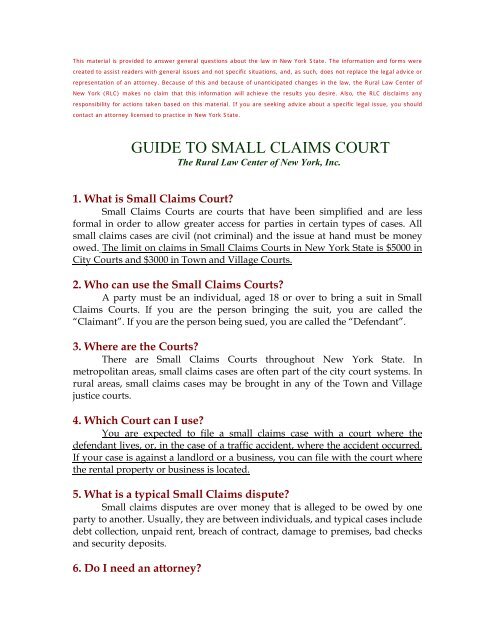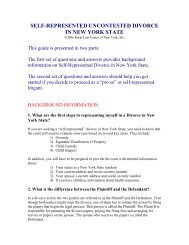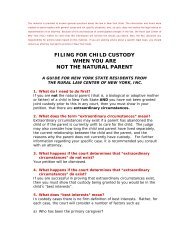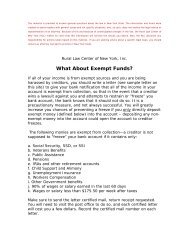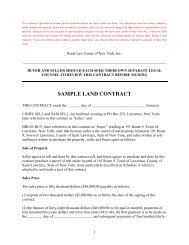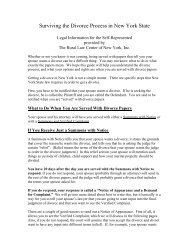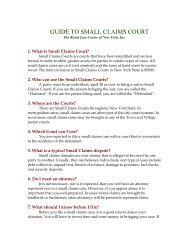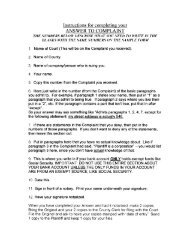GUIDE TO SMALL CLAIMS COURT - Rural Law Center of New York
GUIDE TO SMALL CLAIMS COURT - Rural Law Center of New York
GUIDE TO SMALL CLAIMS COURT - Rural Law Center of New York
Create successful ePaper yourself
Turn your PDF publications into a flip-book with our unique Google optimized e-Paper software.
This material is provided to answer general questions about the law in <strong>New</strong> <strong>York</strong> State. The information and forms were<br />
created to assist readers with general issues and not specific situations, and, as such, does not replace the legal advice or<br />
representation <strong>of</strong> an attorney. Because <strong>of</strong> this and because <strong>of</strong> unanticipated changes in the law, the <strong>Rural</strong> <strong>Law</strong> <strong>Center</strong> <strong>of</strong><br />
<strong>New</strong> <strong>York</strong> (RLC) makes no claim that this information will achieve the results you desire. Also, the RLC disclaims any<br />
responsibility for actions taken based on this material. If you are seeking advice about a specific legal issue, you should<br />
contact an attorney licensed to practice in <strong>New</strong> <strong>York</strong> State.<br />
<strong>GUIDE</strong> <strong>TO</strong> <strong>SMALL</strong> <strong>CLAIMS</strong> <strong>COURT</strong><br />
The <strong>Rural</strong> <strong>Law</strong> <strong>Center</strong> <strong>of</strong> <strong>New</strong> <strong>York</strong>, Inc.<br />
1. What is Small Claims Court<br />
Small Claims Courts are courts that have been simplified and are less<br />
formal in order to allow greater access for parties in certain types <strong>of</strong> cases. All<br />
small claims cases are civil (not criminal) and the issue at hand must be money<br />
owed. The limit on claims in Small Claims Courts in <strong>New</strong> <strong>York</strong> State is $5000 in<br />
City Courts and $3000 in Town and Village Courts.<br />
2. Who can use the Small Claims Courts<br />
A party must be an individual, aged 18 or over to bring a suit in Small<br />
Claims Courts. If you are the person bringing the suit, you are called the<br />
“Claimant”. If you are the person being sued, you are called the “Defendant”.<br />
3. Where are the Courts<br />
There are Small Claims Courts throughout <strong>New</strong> <strong>York</strong> State. In<br />
metropolitan areas, small claims cases are <strong>of</strong>ten part <strong>of</strong> the city court systems. In<br />
rural areas, small claims cases may be brought in any <strong>of</strong> the Town and Village<br />
justice courts.<br />
4. Which Court can I use<br />
You are expected to file a small claims case with a court where the<br />
defendant lives, or, in the case <strong>of</strong> a traffic accident, where the accident occurred.<br />
If your case is against a landlord or a business, you can file with the court where<br />
the rental property or business is located.<br />
5. What is a typical Small Claims dispute<br />
Small claims disputes are over money that is alleged to be owed by one<br />
party to another. Usually, they are between individuals, and typical cases include<br />
debt collection, unpaid rent, breach <strong>of</strong> contract, damage to premises, bad checks<br />
and security deposits.<br />
6. Do I need an attorney
It is not necessary, nor is it expected, that you will have an attorney<br />
represent you in a small claims case. However, if you appear alone, it is<br />
important that you well prepared. In cases where claims are brought by<br />
landlords or businesses, <strong>of</strong>ten attorneys will be present to represent them.<br />
7. What should I know before I file<br />
Before you file a small claims case, it is a good idea to assess your<br />
situation. You will have to invest time and some money in bringing your case. If<br />
the amount <strong>of</strong> money owed is very small, it may not be worth your efforts.<br />
However, if you have decided that it is worth your while to proceed, it is<br />
important that you are prepared before you file. You will be expected to prove<br />
your case and demonstrate exactly how much money is owed to you and for<br />
what reason. Be sure that you have all <strong>of</strong> the necessary documents: copies <strong>of</strong><br />
contracts, promissory notes, checks, receipts, evidence <strong>of</strong> workmanship, etc. The<br />
more prepared you are, the easier it will be for you to file a claim.<br />
8. How do I file<br />
You must get an application form from the court and fill it out. The form<br />
will ask a number <strong>of</strong> questions. Be sure that you have complete information<br />
before you return the form to the court. You must be able to provide the full<br />
name and a street address (not a P.O. box) for the party you are suing. If you are<br />
suing a business you can get the “legal” name <strong>of</strong> the business from your local<br />
County Clerk. Be absolutely certain that you are suing the right person. For<br />
example, if you sue the property manager <strong>of</strong> your apartment house instead <strong>of</strong> the<br />
owner and you win, your judgment may be worthless. Your application will also<br />
ask you for the amount <strong>of</strong> money you are suing for and a description <strong>of</strong> the<br />
reason you are suing the Defendant. Try to be concise in your statement, but be<br />
sure to provide enough information. It is not enough to say, “He owes me<br />
money”.<br />
9. Is there a fee<br />
There is a small filing fee for small claims cases. As <strong>of</strong> this writing, the fees<br />
in City Courts are $15.00 for claims up to $1000, and $20.00 for claims up to<br />
$5000. The filing fees in Town and Village Courts are $10.00 for claims up to<br />
$1000, and $15.00 for claims up to $3000.<br />
10. What happens next<br />
When you give your paperwork to the court, the Court Clerk will select a<br />
date on the court calendar for your case to be heard. Then, the clerk will “serve”<br />
the Defendant with a notice <strong>of</strong> your claim, by mailing to the address you<br />
provided. The notice is sent by certified mail and by ordinary first class mail. If
the first class mailing is not returned to the court as undeliverable, then the<br />
Defendant is assumed to have received it. If the Defendant cannot receive the<br />
notice by mail, the court clerk can tell you how to proceed next. However, your<br />
case cannot continue until the Defendant has been served.<br />
11. What is a Counterclaim<br />
If the person you are suing believes that he or she has a monetary claim<br />
against you, then he or she may file a “counterclaim”. Like your claim, the<br />
Defendant’s counterclaim must state an amount <strong>of</strong> money and the explanation<br />
for the money presumed owed. A counterclaim may be filed for a small fee and<br />
the court will give you notice <strong>of</strong> the filing. If the Defendant in your case has filed<br />
a counterclaim, you should be prepared to deal with that case, as well as your<br />
own.<br />
12. Can my case be settled before I see the judge<br />
Yes, in fact in most Small Claims Courts, the parties are encouraged to<br />
participate in dispute resolution services prior to their court appearance, by<br />
participating in mediation. These mediation services are made available to the<br />
courts by the local Community Dispute Resolution <strong>Center</strong>s (CDRC’s). There is a<br />
CDRC in every county in <strong>New</strong> <strong>York</strong> State, and mediation services are provided<br />
to courts and communities by trained and certified mediators. Mediation has<br />
proven to be extremely successful in small claims cases, since the process allows<br />
both parties to work out a satisfactory solution to their dispute.<br />
13. How does Mediation work<br />
Mediation is an opportunity for the parties to meet with a neutral, third<br />
party (the mediator) and attempt to reach a solution to the dispute that is<br />
acceptable to both parties. Participation in mediation is voluntary and mediation<br />
discussions remain confidential. This gives the parties an opportunity to discuss<br />
the case freely in the hopes <strong>of</strong> working things out. The judge does not participate<br />
in mediations, nor does the mediator provide the court with a report <strong>of</strong> the<br />
discussion. If the mediation results in a signed agreement, only the actual<br />
agreement is provided to the court.<br />
14. Why would I want to mediate my case<br />
Even if you think you have a strong case, there is no guarantee <strong>of</strong> how the<br />
judge will rule. There may be evidence presented by the other party that<br />
convinces the judge to rule against you. And, when the judge rules, there is<br />
always one winner and one loser. In mediations, generally the parties reach a<br />
mutually acceptable compromise. This is certainly preferable to taking a chance<br />
on the judge’s decision. A mediated settlement will give you at least a partial<br />
win, as opposed to a possible complete loss.
15. Is Mediation available in my Small Claims Court<br />
You can ask the court clerk if mediation is a part <strong>of</strong> the small claims<br />
process in that particular court. If it is not, you can contact your local CDRC and<br />
see if arrangements for a mediation session can be made prior to your court date.<br />
Mediation <strong>Center</strong>s are listed by county on the NYS Unified Court System website<br />
at the Alternative Dispute Resolution pages. The web address is<br />
www.courts.state.ny.us/ip/adr/index.shtml.<br />
16. If we work out a solution by mediation, what happens next<br />
If mediation services are part <strong>of</strong> the court process and a solution is<br />
reached, the parties will <strong>of</strong>ten sign a “Settlement Agreement” that will be<br />
presented to the judge. Many Settlement Agreements contain a clause that allows<br />
for an immediate judgment to be enforced if the terms are not complied with in<br />
the time frames specified.<br />
17. What if mediation is not successful, or the other party refuses to<br />
mediate<br />
One <strong>of</strong> the basic principles <strong>of</strong> mediation is the voluntary nature <strong>of</strong><br />
participation. If the other party refuses to mediate, or if there is no agreement,<br />
then the case proceeds to court, as it was originally scheduled.<br />
18. How should I be prepared for court<br />
Remember that appearance in the courtroom is very important and you<br />
will want to do everything possible to make a good first impression. Even<br />
though the small claims process is less formal than other court proceedings, it is<br />
important to appear in a way that is respectful to the court. It would be a mistake<br />
to take a chance <strong>of</strong> <strong>of</strong>fending the court by the wrong attire. This could<br />
unnecessarily prejudice your case. If possible, wear something simple and<br />
businesslike. Avoid shorts, torn jeans, and anything that is not clean or too<br />
revealing.<br />
19. What should I do on my court date<br />
Give yourself plenty <strong>of</strong> time to get to court. You don’t want to be late. Plan<br />
to arrive at least half an hour before the court time. When you arrive, be sure to<br />
check in with the court clerk. You will be directed to a waiting area, and in some<br />
cases to a mediation coordinator. When it is time for your case, your name will<br />
be called and you will be shown into the courtroom.<br />
20. If my case is not settled prior to my court time, what will<br />
happen in the courtroom
Formal court procedures are typically simplified so that both parties can<br />
appear and present their cases without attorney representation. When your case<br />
is called, the judge will ask you to explain your case and to provide the evidence<br />
you have to support it. Be sure to have all the documents with you that are<br />
necessary to prove your points. Have clean copies <strong>of</strong> everything (checks,<br />
receipts, written estimates, contracts, photos, damaged goods, etc.) and be<br />
prepared to leave them with the court, if asked. When speaking to the court, be<br />
sincere and respectful. Be sure to answer the judge’s questions, but keep your<br />
answers short. Especially avoid rambling or repetition and, don’t interrupt the<br />
judge or the other party. If you have the opportunity to present a witness, ask<br />
only brief questions that will support your facts. The judge will hear both sides<br />
and will likely make an immediate decision.<br />
21. What if I am the Defendant and I don’t appear<br />
If you are the party being sued, and you don’t appear for the court date,<br />
you will, most likely lose by default. It is always a good idea to appear. Even if<br />
you believe that you owe the money, you should take the opportunity to reach a<br />
settlement that sets out terms that are satisfactory to you through mediation.<br />
And, if you have evidence that you don’t owe the money, or the amount is<br />
incorrect, this is your opportunity to be heard. Remember, it is the responsibility<br />
<strong>of</strong> the person suing you to prove their case against you. If you are present in<br />
court and you have a valid defense or pro<strong>of</strong> that contradicts the claim, then your<br />
side will be heard.<br />
22. What if the judge decides in my favor<br />
If you win your case, the court will issue a judgment that states that a<br />
specific amount <strong>of</strong> money is owed to you by the Defendant. The court, however,<br />
does not collect the money for you. It is your responsibility to collect the money,<br />
and you should immediately contact the Defendant and attempt to collect. A<br />
judgment in your favor is not a guarantee that you will be paid, it is simply a<br />
legally enforceable finding that you have a right to this money.<br />
23. What if the Defendant doesn’t pay the money owed<br />
If the Defendant doesn’t pay the money owed to you, there a number <strong>of</strong><br />
possible actions that you can take. You should ask the court clerk for any<br />
information about the possibility <strong>of</strong> locating the Defendant’s assets and about<br />
any assistance you might receive from the local sheriff’s <strong>of</strong>fice. Also, you might<br />
decide to file the judgment with your County Clerk. This will place a lien against<br />
any real estate owned by the Defendant. Also, there might be ways to investigate<br />
the possibility <strong>of</strong> seizing other property. Some property is exempt from seizure<br />
and if the Defendant owns no property, there is probably no chance to collect the<br />
money owed.
24. If I lose my case, can I appeal<br />
It is possible to appeal a small claims decision, but such cases are difficult<br />
to win. In addition, you will probably have to hire an attorney and assume even<br />
additional financial expense. Since these are claims for relatively small amounts<br />
<strong>of</strong> money, your best strategy is to be well prepared when you go to court.


